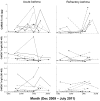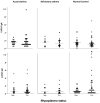Mycoplasma pneumoniae in children with acute and refractory asthma
- PMID: 23622002
- PMCID: PMC3703852
- DOI: 10.1016/j.anai.2013.01.022
Mycoplasma pneumoniae in children with acute and refractory asthma
Erratum in
- Ann Allergy Asthma Immunol. 2013 Oct;111(4):309
Abstract
Background: The presence of Mycoplasma pneumoniae has been associated with worsening asthma in children. Sensitive assays have been developed to detect M pneumoniae-derived community-acquired respiratory distress syndrome (CARDS) toxin.
Objectives: To identify the frequency and persistence of M pneumoniae detection in respiratory secretions of children with and without asthma and to evaluate antibody responses to M pneumoniae and the impact of M pneumoniae on biological markers, asthma control, and quality of life.
Methods: We enrolled 143 pediatric patients (53 patients with acute asthma, 26 patients with refractory asthma, and 64 healthy controls; age range, 5-17 years) during a 20-month period with 2 to 5 follow-up visits. We detected M pneumoniae using CARDS toxin antigen capture and polymerase chain reaction and P1 adhesin polymerase chain reaction. Immune responses to M pneumoniae were determined by IgG and IgM levels directed against CARDS toxin and P1 adhesin. pH was measured in exhaled breath condensates, and asthma control and quality of life were assessed using the Asthma Control Test and Pediatric Asthma Quality of Life Questionnaire.
Results: M pneumoniae was detected in 64% of patients with acute asthma, 65% with refractory asthma, and 56% of healthy controls. Children with asthma had lower antibody levels to M pneumoniae compared with healthy controls. Exhaled breath condensate pHs and asthma control and quality of life scores were lower in M pneumoniae-positive patients with asthma.
Conclusion: The results suggest that M pneumoniae detection is common in children, M pneumoniae detection is associated with worsening asthma, and children with asthma may have poor humoral immune responses to M pneumoniae.
Copyright © 2013 American College of Allergy, Asthma & Immunology. Published by Elsevier Inc. All rights reserved.
References
-
- Bel EH, Sousa A, Fleming L, Bush A, Chung KF, Versnel J, et al. Diagnosis and definition of severe refractory asthma: an international consensus statement from the Innovative Medicine Initiative (IMI) Thorax. 2010;76:910–7. - PubMed
-
- Hahn DL, McDonald R. Can acute Chlamydia pneumoniae respiratory tract infection initiate chronic asthma? Annals of Allergy, Asthma & Immunology. 1998;81:339–44. - PubMed
-
- Kraft M, Cassell GH, Henson JE, Watson H, Williamson J, Marmion BP, et al. Detection of Mycoplasma pneumoniae in the airways of adults with chronic asthma. Am J Respir Crit Care Med. 1998;158:998–1001. - PubMed
-
- Good JT, Jr, Kolakowski CA, Groshong SD, Murphy JR, Martin RJ. Refractory asthma: importance of bronchoscopy to identify phenotypes and direct therapy. Chest. 2012;141:599–606. - PubMed
-
- Leaver R, Weinberg EG. Is Mycoplasma pneumoniae a precipitating factor in acute severe asthma in children? S Afr Med J. 1985;68:78–9. - PubMed
Publication types
MeSH terms
Substances
Grants and funding
LinkOut - more resources
Full Text Sources
Other Literature Sources
Medical





